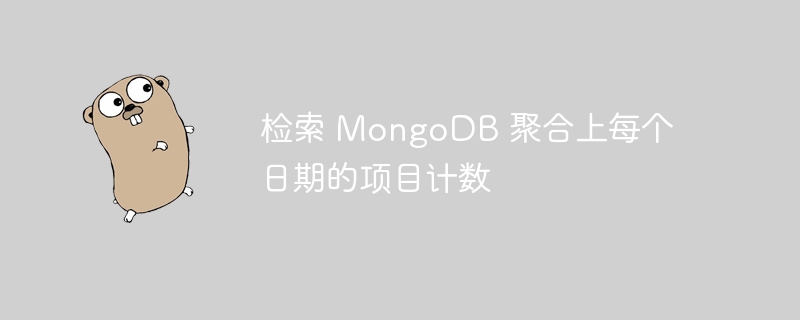Home >Backend Development >Golang >Retrieve item count for each date on MongoDB aggregate
Retrieve item count for each date on MongoDB aggregate
- 王林forward
- 2024-02-06 10:36:04554browse

I have a collection containing events. Each event has a timestamp accurate to milliseconds. I want to group daily events. For example:
I have
key value _id 111222333444555ddd666fff time 2023-04-23t15:35:19.631z type pizza-event _id 111222333444555ddd666fff time 2023-04-23t01:41:20.631z type tv-event _id 111222333444555ddd666fff time 2023-04-22t05:00:05.631z type some-event
I do
key value date 04-22-2023 count 1.0 date 04-23-2023 count 2.0
The ultimate goal is to use queries in golang projects.
So far I have
[
{
"$match" : {
"$and" : [
{
"type" : "foo.bar.event"
},
{
"time" : {
"$gte" : isodate("2023-04-23t00:00:00.000+0000")
}
},
{
"time" : {
"$lte" : isodate("2023-04-25t00:00:00.000+0000")
}
}
]
}
},
{
"$group" : {
"_id" : {
"$datetostring" : {
"format" : "%m-%d-%y",
"date" : "$time"
}
},
"count" : {
"$sum" : 1.0
}
}
}
]
return
key value _id 04-24-2023 count 476.0 _id 04-23-2023 count 28.0
This was supposed to work, but when I write this query in my go project, a red squiggly line appears under "$datetostring" with the message "Invalid field name", ideally I would like the date to have a " time" key instead of "_id". When I make the following changes during the group stage:
{
_id: null,
"date": {"$dateToString": { "format": "%m-%d-%Y", "date": "$time"}},
"count": {"$sum": 1}
}
I'm getting an unknown group operator '$datetostring' error. So I thought of creating the group and then adding an item stage for "$datetostring" but now the group stage returns the group every millisecond which defeats the purpose of grouping.
I realize I'm discussing two different issues. However, while any help would be great, this question is specifically about fixing mongo queries. I'll return to golang coding on another thread if necessary. If I can make it clearer, please let me know.
Correct answer
First of all, if you have an application ui to display the query results, you don't have to bother formatting the output in the query. This is the responsibility of the application ui. BTW, if you have an application ui, consider using $datetrunc instead of $datetostring.
Anyway, regarding the requirements in your question, a $project stage like this should work for you:
[
{
"$group": {
"_id": {
"$datetostring": { "date": "$time", "format": "%m-%d-%y" }
},
"count": { "$sum": 1 }
}
},
{ "$project": { "_id": 0, "time": "$_id", "count": "$count" } }
]
mongodb shell output:
{ "time" : "02-08-2020", "count" : 2 }
{ "time" : "05-18-2020", "count" : 2 }
{ "time" : "03-20-2021", "count" : 3 }
{ "time" : "01-11-2021", "count" : 1 }
Regarding using queries in go projects, here is a demonstration:
package main
import (
"context"
"fmt"
"time"
"go.mongodb.org/mongo-driver/bson"
"go.mongodb.org/mongo-driver/mongo"
"go.mongodb.org/mongo-driver/mongo/options"
)
func main() {
ctx, cancel := context.WithTimeout(context.Background(), 20*time.Second)
defer cancel()
client, err := mongo.Connect(ctx, options.Client().ApplyURI("mongodb://localhost:27017"))
if err != nil {
panic(err)
}
coll := client.Database("baz").Collection("cakeSales")
matchStage := bson.D{
{"$match", bson.D{
{"$and", []bson.D{
{{"time", bson.D{
{"$gte", time.Date(2019, 6, 1, 0, 0, 0, 0, time.UTC)},
}}},
{{"time", bson.D{
{"$lte", time.Date(2021, 2, 1, 0, 0, 0, 0, time.UTC)},
}}},
}},
}},
}
groupStage := bson.D{
{"$group", bson.D{
{"_id", bson.D{
{"$dateToString", bson.D{
{"date", "$time"},
{"format", "%m-%d-%Y"},
}},
}},
{"count", bson.D{
{"$sum", 1},
}},
}},
}
projectStage := bson.D{
{"$project", bson.D{
{"_id", 0},
{"time", "$_id"},
{"count", "$count"},
}},
}
cursor, err := coll.Aggregate(context.TODO(),
mongo.Pipeline{matchStage, groupStage, projectStage})
if err != nil {
panic(err)
}
var results []bson.M
if err = cursor.All(context.TODO(), &results); err != nil {
panic(err)
}
for _, result := range results {
fmt.Printf(
"time: %s count: %v\n",
result["time"],
result["count"])
}
}
The above is the detailed content of Retrieve item count for each date on MongoDB aggregate. For more information, please follow other related articles on the PHP Chinese website!
Related articles
See more- Explain how Go's garbage collection works. What are the trade-offs?
- Explain the concept of "zero values" in Go.
- What are runes in Go? How do they relate to strings and Unicode?
- Explain the purpose of Go's reflect package. When would you use reflection? What are the performance implications?
- How does Go handle string formatting? (e.g., fmt.Printf, fmt.Sprintf)

